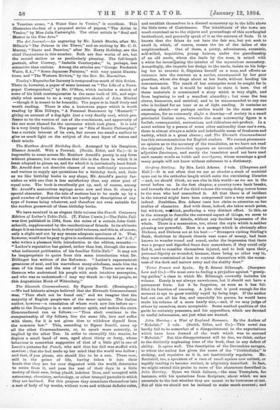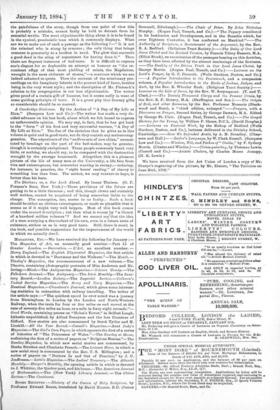John Herring : a West of England Romance. By the
Author of " Mehalah." 3 vols. (Smith, Elder, and Co.)—This novel Can hardly fail to be somewhat of a disappointment to the expectations which have been formed of the work which was to succeed " Mehalah." But this disappointment will be due, we think, rather to the distinctly unpleasiog tone of the book, than to any defect of ability. It opens well. The description of the Devonshire savages, to whom the author has given the name of the " Cobbledicks;" is striking, and repulsive as it is, not inartistically repulsive. Mr. Battishill, too, a specimen of a race of small squires now extinct, or rapidly tending to become extinct, is admirably described. In fact, we might extend this praise to more of the characters described in John Herring. Some we think failures,—the man Tramplers, for instance, with his quotations from Scripture, about which we are uncertain to the last whether they are meant to be humorous or not. But of this we should not be inclined to make much account; and the painfulness of the story, though from one point of view this is probably a mistake, cannot fairly be held to detract from its essential merits. The most objectionable thing about it is to be found in the cynical, pessimistic tone which it commonly displays. What are we to make out of such a passage as the following P—" It is not the criminal who is stung by remorse ; the only thing that brings remorse is generosity to a brother in need. The glow that succeeds a good deed is the sting of repentance for having done it." Then there are flagrant instances of bad-taste. It is difficult to express one's disgust for so deplorable an attempt at humour as "the re- cumbent effigy of that most yielding of saints, the Magdalene, wrought in the most obdurate of stones,"—a sentence which we are indeed ashamed to quote. Then the account of the missionary pro- ceedings on the Imaginary Islands is the poorest kind of farce, besides being in the very worst style ; and the description of Mr. Flamank's relation to his congregation is not less objectionable. The writer gives proof of a certain gift of humour, but it seems sadly in want of some guiding principle of taste. It is a great pity that literary gifts SO considerable should be so marred.







































 Previous page
Previous page